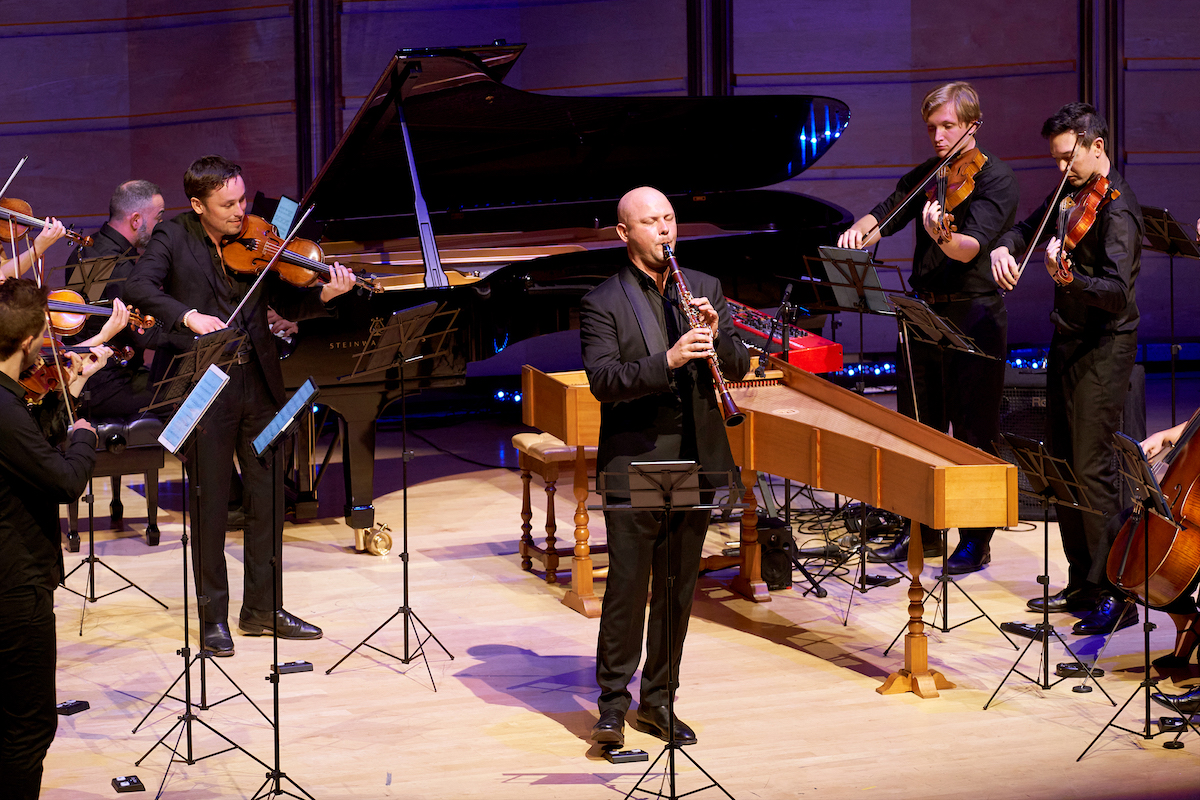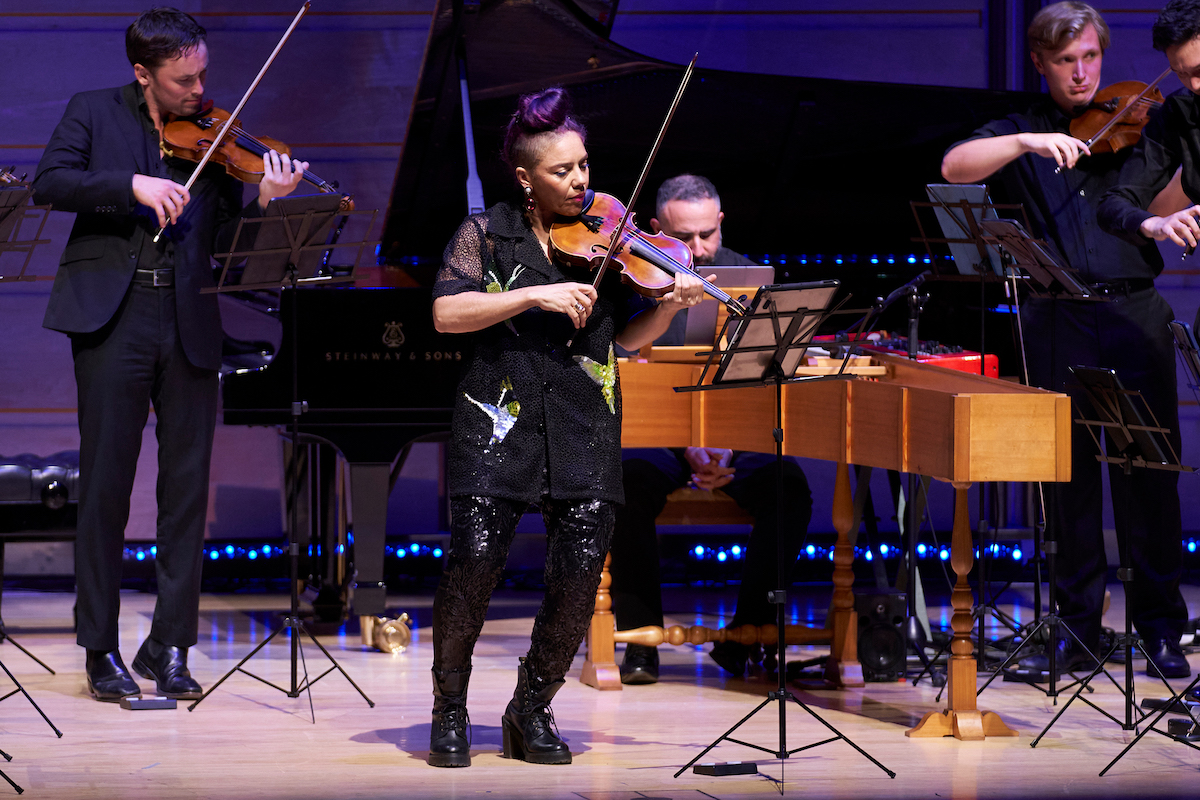The past reconsidered and the present reconfigured: That was the promise of Omega Ensemble’s second tour of the year which featured two world premieres and culminated in an outstanding performance of Max Richter’s hugely popular 2012 deep dive into Antonio Vivaldi’s The Four Seasons.
Playing to a City Recital Hall audience packed out on two of its three tiers, charismatic Omega regular violinist Véronique Serret took solo honours in that work as well as New York composer Jessie Montgomery’s new piece, Concerto Grosso, which Omega co-commissioned with Chicago Symphony Orchestra, Aspen Music Festival and Boston Symphony Orchestra.
Here she was joined by the ensemble’s Artistic Director David Rowden on clarinet in a free-wheeling duet over a ripieno orchestra, with Omega’s numbers swollen to 18 musicians including harp and keyboard/synthesiser.

Omega Ensemble (David Rowden, centre) performs Re:Classical. Photo © Jay Patel
The group performed another of her works, Strum, in their Ecstatic Dances tour last year and that left many of the audience wanting to hear more of the 42-year-old composer’s works. Inspired by folk music, that piece got its title from the repeated pizzicato strumming effects of the various strings and was full of toe-tapping rhythms and catchy melodies, reminding this listener of early Kronos world music records.
The two-movement new work, as its name suggests, is inspired by the Baroque device of pitting solo instruments against an orchestral backdrop. The soloists are called on to improvise and Serret suits this role perfectly as she has shown herself to be one of our most versatile violinists, equally at home in classical, contemporary, avant-garde and rock genres.
Montgomery leaves it to the soloists to “choose your own adventure” with spontaneity “that can either blend or add new textures”.
This is positive and invigorating tonal music, occasionally dissonant and mysterious, and with a soundscape that alternates between lushness and urgency.

Omega Ensemble (Véronique Serret, centre) performs Re:Classical. Photo © Jay Patel
The second world premiere was Elena Kats-Chernin’s reworking of her concerto for basset clarinet Ornamental Air, composed in 2007 for clarinetist Michael Collins as a companion piece to Mozart’s Clarinet Concerto. Rowden had helped the composer during its development.
“Like much of her music, it’s been stuck in my head like a bright and wonderful ear worm. I thought it time to give it a go myself,” Rowden said.
The “foot-stomping new version” is a typically attractive work which gives a nod to Baroque embellishments – a lot of dazzling solo runs and athletic leaps – stirred in with Kats-Chernin’s enthusiasm for folk and jazz rhythms and textures.
Rowden faced the prodigious challenges with consummate ease, with his handling of the fizzing pyrotechnics of the final cadenza quite stunning.
The ensemble, led by Peter Clark on violin and driven by Vatche Jambazian’s piano and Georgia Lowe’s harp, were on point for the three movements with their infectious cross-rhythms – at times the tango-like pulse summoning visions of gauchos galloping across the plains of Argentina.
The lush middle movement, with its sliding bluesy figures, showed Rowden’s beauty of tone and phrasing, while the octave leaps of the finale exploited the extended range of the basset clarinet, with its extra low notes.
The Richter recomposition was based on his original survey of Vivaldi’s concertos made in 2012 and performed by Daniel Hope in 2014 to worldwide acclaim – boosting the German-British composer’s Spotify streaming audience to close to 4.5 million – and not the new version he released in 2022.
Jambazian, seated at the harpsichord with the synthesiser next to him, set off the quiet, hazy shimmer of the introduction to Spring I before Serret and the high strings exchanged a riot of chirping birdsong over the calm chords of harp and lower strings.
Serret was impeccable throughout this 45-minute performance, sharing some beautiful moments with Clark’s violin, Paul Stender’s cello and Neil Thompson’s viola.
It is easy to forget that when Richter worked his way assiduously through Vivaldi’s score – discovering all sorts of things on the way – The Four Seasons were rarely performed in their entirety, the constant use of snatches of them for TV commercials, film soundtracks, lift music and ringtones having turned them into a cliché. He used about one-quarter of Vivaldi’s score, composing the rest himself but managing to stay true to the spirit of the original.
Now barely a year goes by without someone including the four concertos in their season brochure. And thanks to triumphant performances like this one by Serret and company – and that of Ray Chen with Sydney Symphony Orchestra a couple of years ago – Richter’s reinvention has become a concert hall favourite.
Omega Ensemble performs Re:Classical at Melbourne Recital Centre, 15 April; Newcastle City Hall, 18 April, and the Joan Sutherland Performing Arts Centre, Penrith, 20 April.











Comments
Log in to join the conversation.